Internet Statistics 2022: Facts You Need-to-Know
The digital landscape is continuously growing and evolving. There are many interesting facts about the internet, internet statistics, and ways to use the internet more than you can imagine.
To help you comprehend the size, impact, and purpose of the internet (and World Wide Web) as a whole, we decided to supply you with some of the most notable information that will provide you with some perspective on the internet world as a whole.
Internet users demographics
The internet has become widespread across the globe as one of the most iconic technological achievements. Let’s look at the graph below and see how widespread the internet actually is, whether there are any continents that are entirely covered with the internet, and which countries don’t have it.
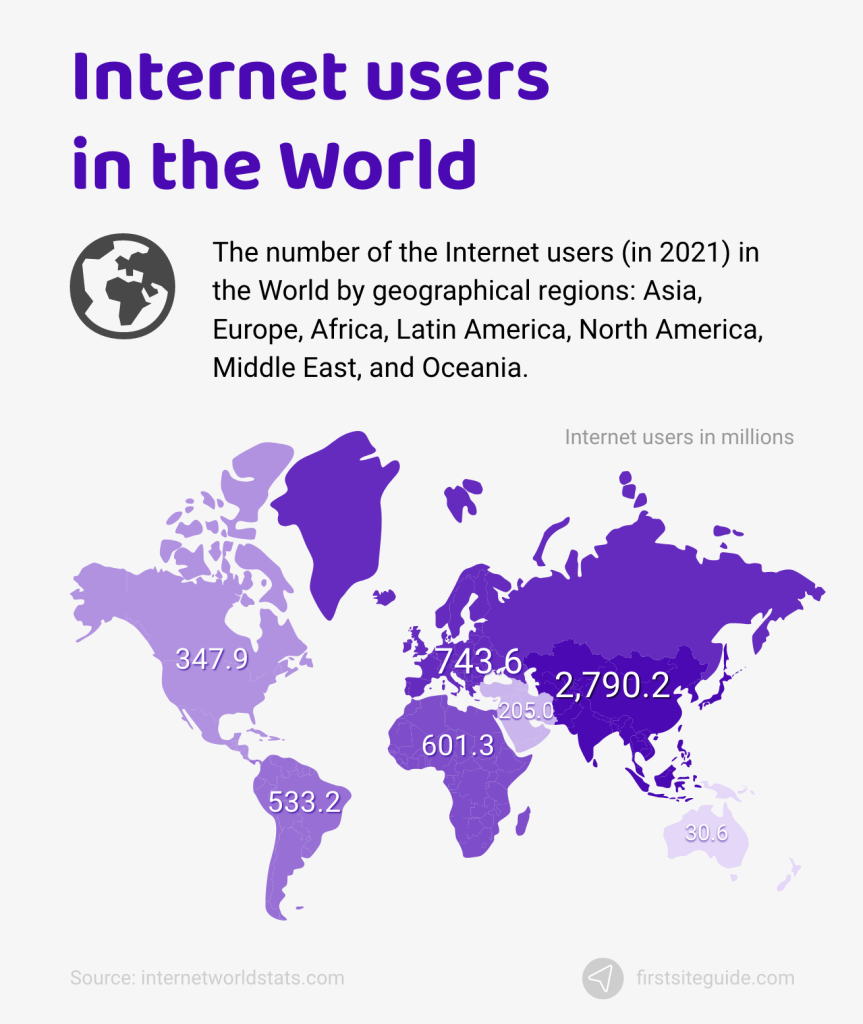
(Source: Internet World Stats)
Below, we’ll list some of the most popular general internet stats to pique your interest and answer questions such as how many people in the world have the internet, how many websites are on the internet, how much people blog daily, and how many countries have internet access.
1. 5.25 billion people use the internet daily.
As of December 31, 2021, internet statistics show that there are over 5.25 billion active internet users across the world. If you are wondering how many countries have internet access, this number increases by the day, but there are still over 2.7 billion people with no internet access.
The global population in 2022 is supposed to reach 7.9 billion people. There are over 5.25 billion unique internet users, so they account for approximately 66% of the entire population.
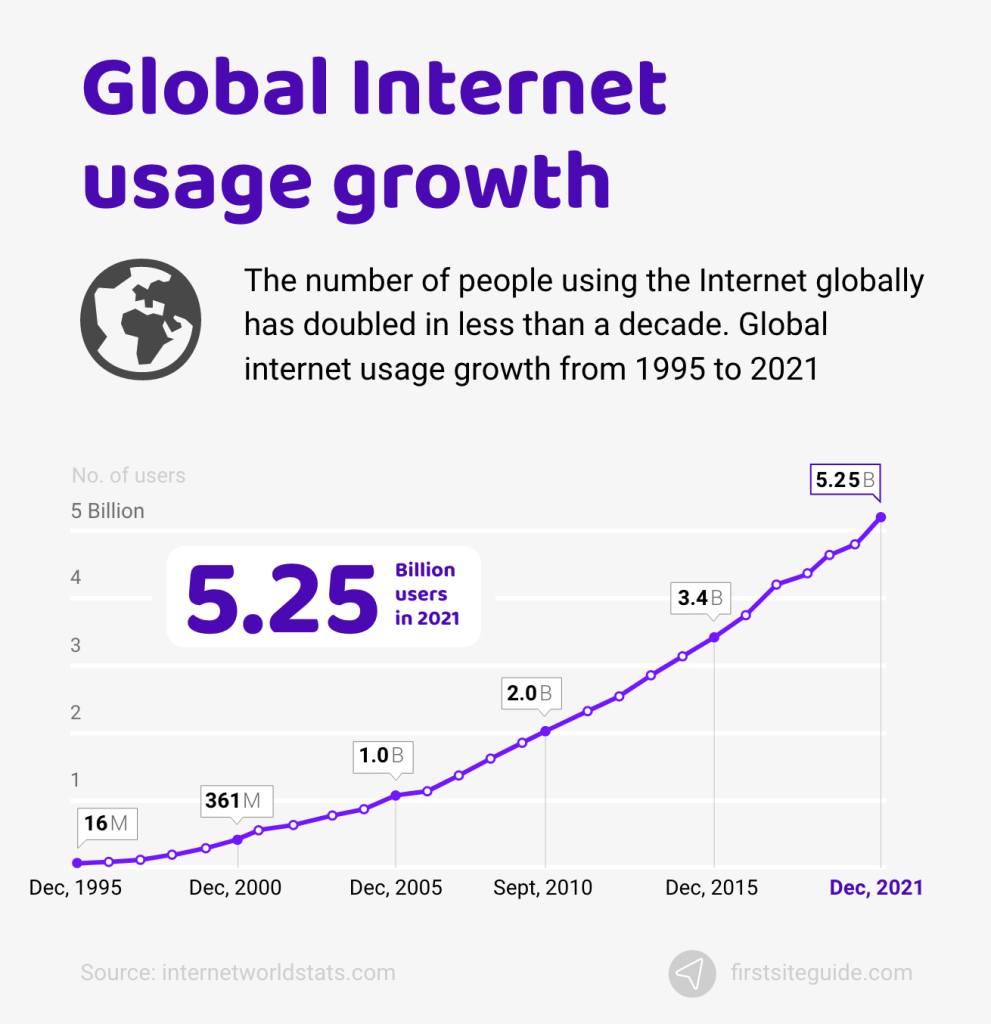
(Source: Internet World Stats)
2. The average growth rate of internet users is 8.2% per year.
The number of internet users increases at an average rate of 8.2% a year. Compared to this, the global population increases at an average rate of just 1.05% annually.
After
the radio was invented, it took 38 years to reach 50 million users. It
took 75 years for the telephone to do the same. However, the internet
around the world has managed to reach 50 million users in just four years.
(Source: Datareportal)
3. More than 25% of websites are in English.
The most popular language by far on the internet is English. 25.9% of the internet is in English, 19.4% is in Chinese, and 8% is in Spanish.
(Source: Statista)
4. Asia has the largest number of internet users with over 2.8 billion.
To answer the question of how many countries have internet access, we’ll start with regions. Internet world stats show that Asia is the continent with the highest number of internet users in the world, over 2.8 billion. Europe takes second place with less than half of this number, boasting just under 700 million internet users.
Unsurprisingly,
as one of the most populous countries globally, China also boasts the
highest number of internet users. As of February 2022, China has over 1 billion active users. It’s followed by India and 658 million users, while the USA takes third place with 307 million users.
(Source: Statista)
5. Europe is the 2nd most popular region by internet users, with 705 million internet users.
Europe has around 705 million internet users, which places it in the second spot of regions according to the global internet population. Asia comes in first with over 2 billion internet users.
(Source: Statista)
6. 98-99% of people have the internet in Denmark, Iceland, the UAE, Kuwait, and Qatar.
As of January 2021, Denmark, Iceland, the UAE, Kuwait, and Qatar have the highest internet penetration rate of any country in the world. Between 98% and 99% of the population of these countries has internet access.
As might be expected, North Korea ranks last for the number of internet users. According to a survey, the internet penetration rate is 0% here. Next to last is Eritrea, with 8% internet penetration, closely followed by South Sudan (8.3% internet penetration).
(Source: Statista)
7. 32% of Internet users worldwide are 25 to 34 years old.
As
of December 2019, studies have concluded that over a third of internet
users are 25-34 years old. They’re closely followed by the 35-44 age demographic, which makes up 19% of the global internet traffic statistics for users.
(Source: Statista)
8. The Chrome web browser is used by 65.9% of internet users worldwide.
As of August 2020, Chrome takes up over 65% of the global browser space. It’s followed by Safari, which accounts for 16.82% of all internet users in the world, and Firefox in third place with 4.09%.
(Source: Statcounter)
9. Internet connection speed by countries.
The UAE holds the fastest mobile global average internet speed with a fantastic 110.90 Mbps download. The country with the fastest fixed broadband connection in Singapore, with 213.18 Mbps download.
The global average for mobile connections is 34.51 Mbps for download, 10.93 Mbps for upload, and 41 ms latency. The global fixed broadband average is 81.46 Mbps for download, 42.63 Mbps for upload, and 22 ms latency.
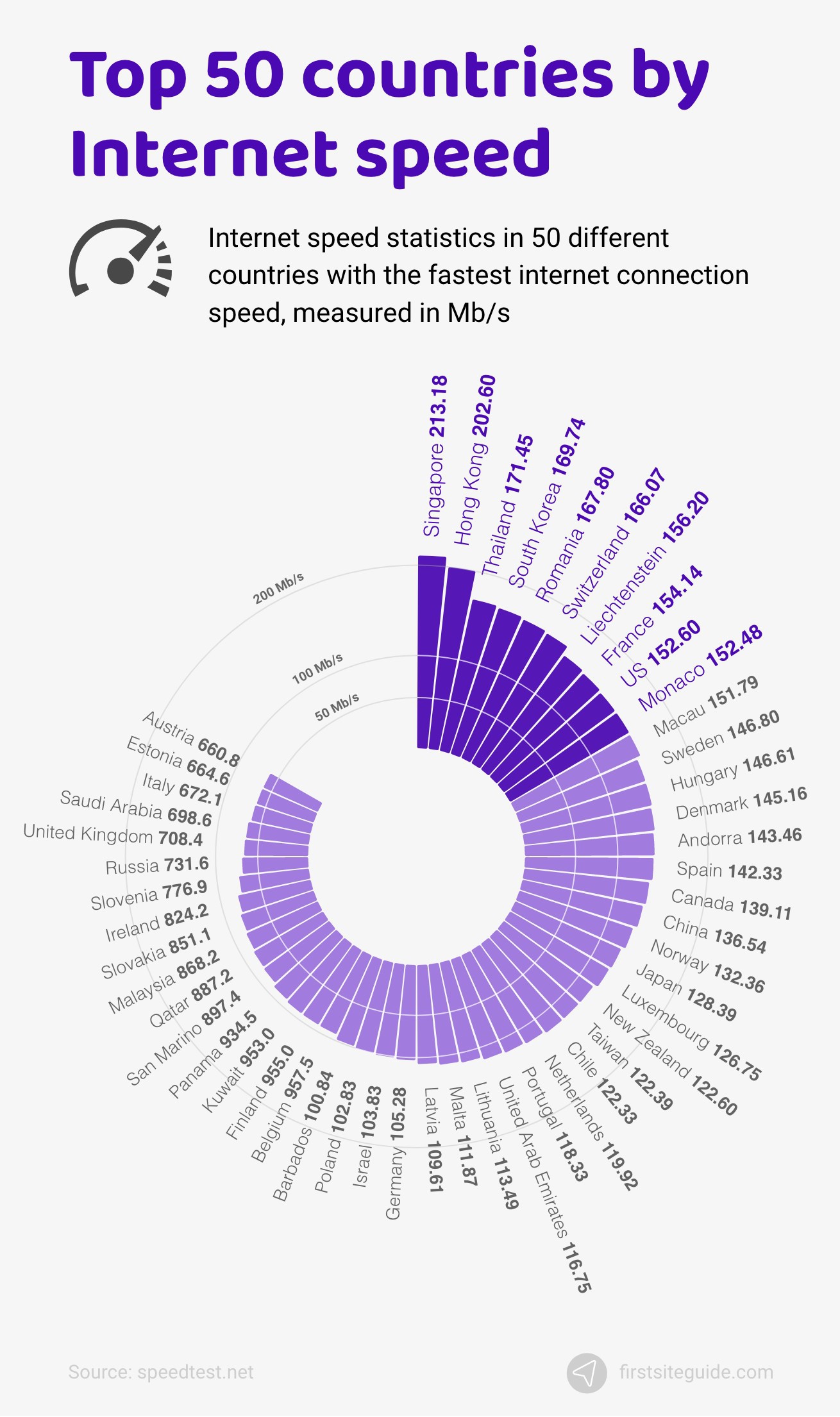
(Source: Speedtest and Fastmetrics)
10. 4.1 billion email users registered worldwide in 2020.
As of 2021, there are over 4.1 billion email accounts registered by internet users worldwide, 107 million more than in 2019. This number is expected to grow by over 4.3 billion by the end of 2023. It doesn’t mean that each email is operated by an individual person, as people tend to have multiple email addresses.
(Source: Radicati)
Web Search Stats
There are a lot of ways to use the internet, as well as interesting facts available about the internet. A common question that is asked is:
“How many people are on the internet right now, and what do people do on the internet exactly?”
To answer this question about how people use the internet, we’ve come up with some more exciting internet statistics about internet users and internet use statistics.
11. Most popular web search engines.
The search engine world is dominated by Google, which is the most popular web search engine according to Google search stats. The top six search engines, according to popularity are:
- Google – 92.7% market share
- Bing – 2.8% market share
- Yahoo! – 1.6% market share
- Baidu – 0.9% market share
- Yandex – 0.8% market share
- DuckDuckGo – 0.5% market share
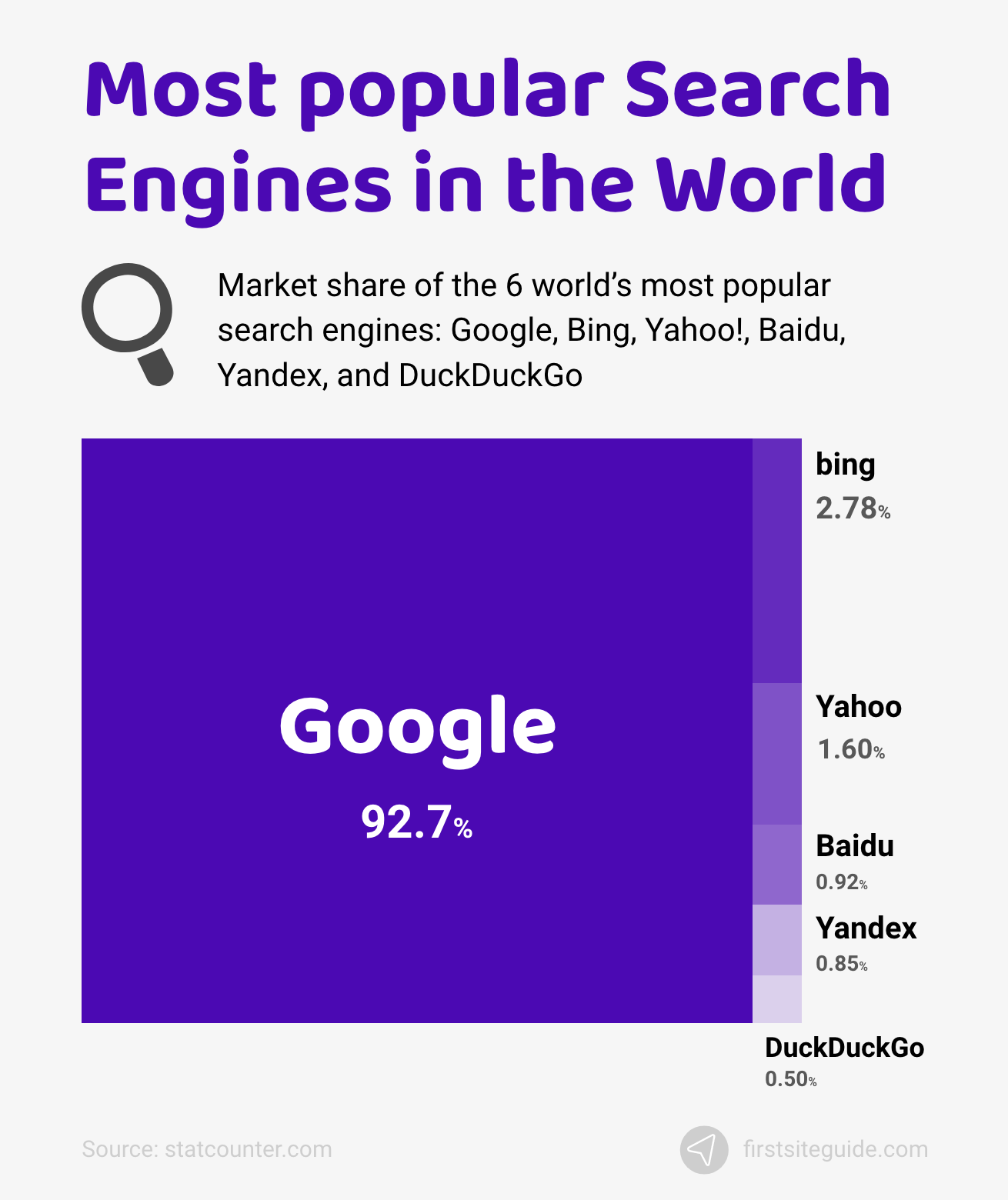
(Source: Statcounter)
12. 92.17% use the Google search engine.
Google takes the cake for the world’s most popular search engine by a considerable margin. An estimated 92.17% of the global internet population uses Google, which accounts for over 4.206 billion people.
(Source: Statcounter)
13. 2.78% use the Bing search engine.
Bing is a far less popular alternative to Google but it is still the second most popular search engine, with 2.78% of internet users using Bing rather than Google according to internet traffic statistics.
(Source: Statcounter)
14. 1.6% use the Yahoo! search engine.
Launched in 1994, Yahoo is one of the oldest search engines. It is still around, and today, it accounts for 1.6% of the market share according to internet usage statistics.
(Source: Statcounter)
15. 0.92% use the Baidu search engine.
Baidu is a Chinese web search engine and accounts for only 0.92% of the global market share. This internet company specializes in AI and has already overtaken Google in the smart speaker market, holding over 17.3% of the usage.
(Source: Statcounter)
16. 0.85% use the Yandex search engine.
Yandex is the fifth most popular search engine and accounts for 0.85% of the market share according to internet traffic statistics.
(Source: Statcounter)
17. 0.50% the DuckDuckGo search engine.
Last, but not least, is DuckDuckGo. This search engine places a huge emphasis on privacy, and offers uniform SERP for all users, without profiling. This distinction is important for some users, and it accounts for 0.50% of the market share, according to internet traffic statistics.
(Source: Statcounter)
18. 10 most popular websites on the web.
The top 10 most popular websites on the internet according to Alexa are:
- Google.com (Alexa rank: 1)
- Youtube.com (Alexa rank: 2)
- Tmall.com (Alexa rank: 3)
- Baidu.com (Alexa rank: 4)
- Qq.com (Alexa rank: 5)
- Facebook.com (Alexa rank: 6)
- Sohu.com (Alexa rank: 7)
- Taobao.com (Alexa rank: 8)
- 360.cn (Alexa rank: 9)
- Yahoo.com (Alexa rank: 10)
Alexa rank is a measure of website popularity with 1 being the most popular. It is calculated by the site’s estimated traffic and visitor engagement. . .
Mobile Web Stats
Mobile is a rising platform for internet use, and since smartphones have become as global as the internet, it’s a brand new niche and market that search engines, websites, and the whole internet are trying to appeal to.
The mobile market is breaking records every year, and quite a lot of people enjoy using their mobile phones to access the internet. The smartphone world is full of convenience, along with apps, and it accounts for more than half of all online traffic.
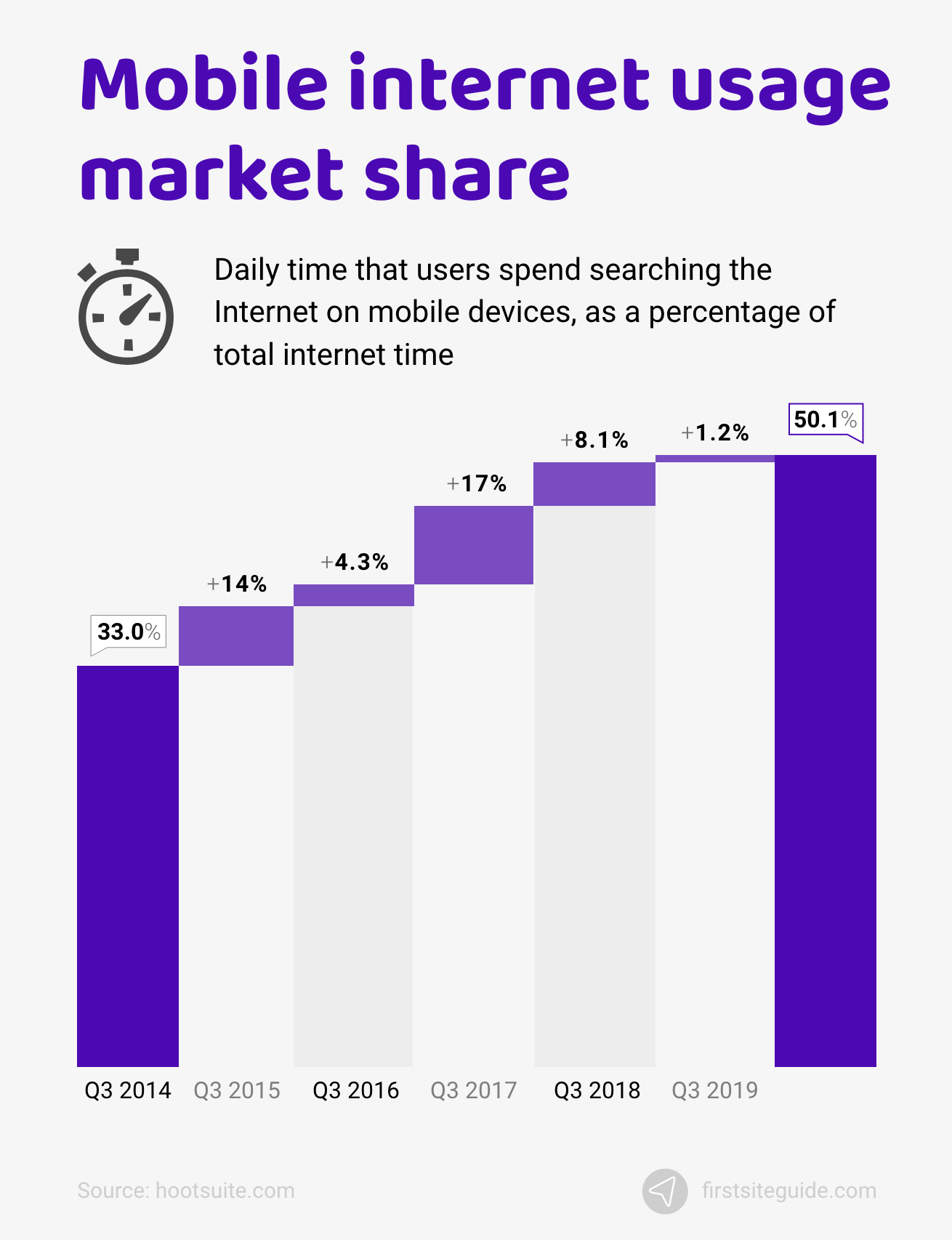
(Source: Hootsuite)
Below, we’ll explore all of the statistics involving mobile phones.
22. 4.32 billion people use their mobile devices to go online.
On a global scale, over 4.32 billion unique users access the internet from their mobile devices. Because there are 4.66 billion internet users, it’s obvious that the vast majority of them use their mobile devices.
(Source: Statista)
23. State of global mobile internet connectivity by region.
The most connected region globally is North America, with over 75% of people having an internet connection. It is closely followed by Europe, in which over 68% of all people have internet access. The region with the least internet connectivity is Sub-Saharan Africa, with 24% of people having internet access according to internet usage statistics.
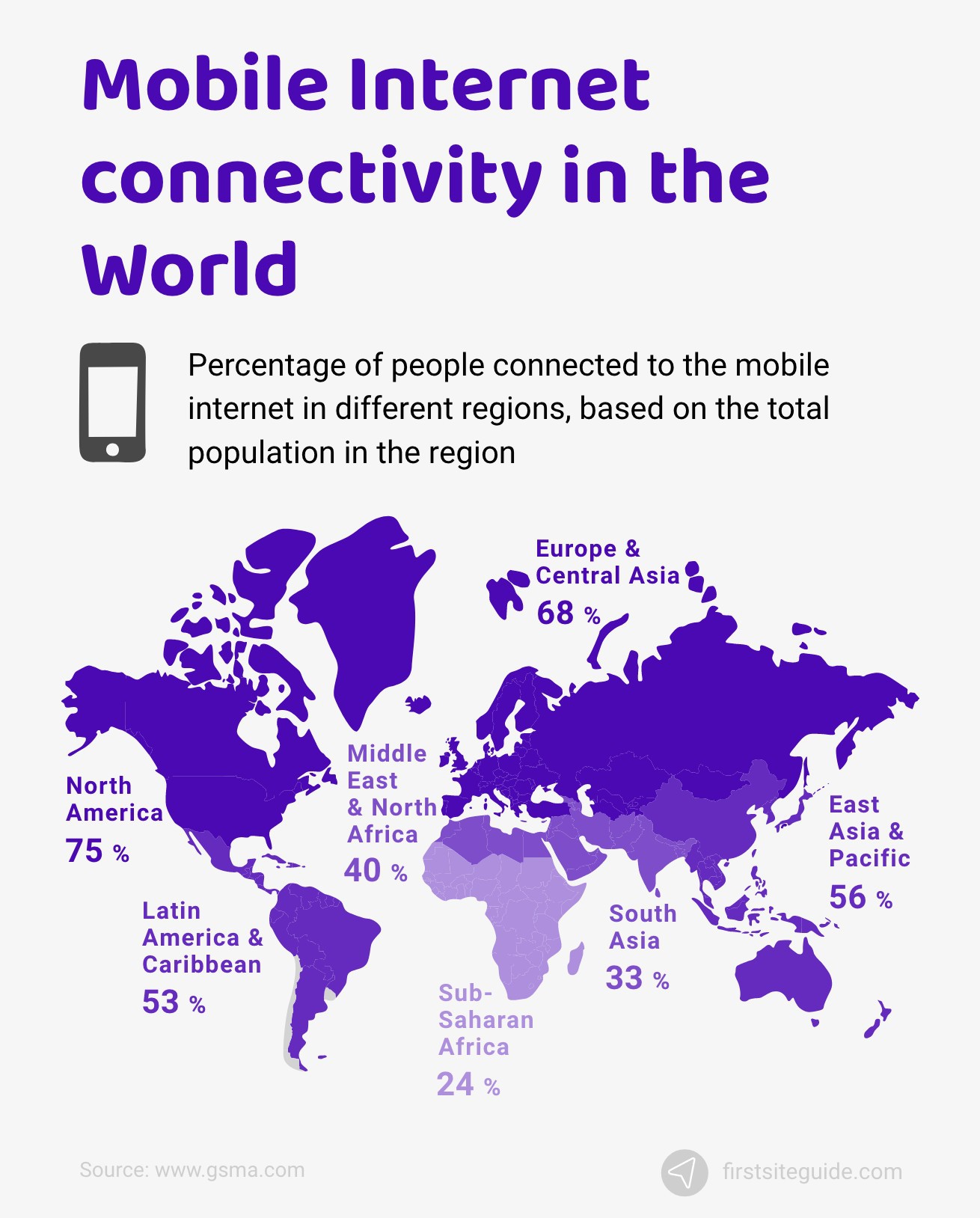
(Source: GSMA
24. The number of mobile users by platform (Android, IOS, etc.)
Most mobile users are using Android OS. Android accounts for a whopping 74.25% of the global market. Next in line is IOS, which holds 25.15% of the mobile global internet usage market. Samsung comes in third place, with 0.23% of the worldwide market. KaiOS and Windows are the least popular ones with 0.08% and 0.03% worldwide usage, respectively.
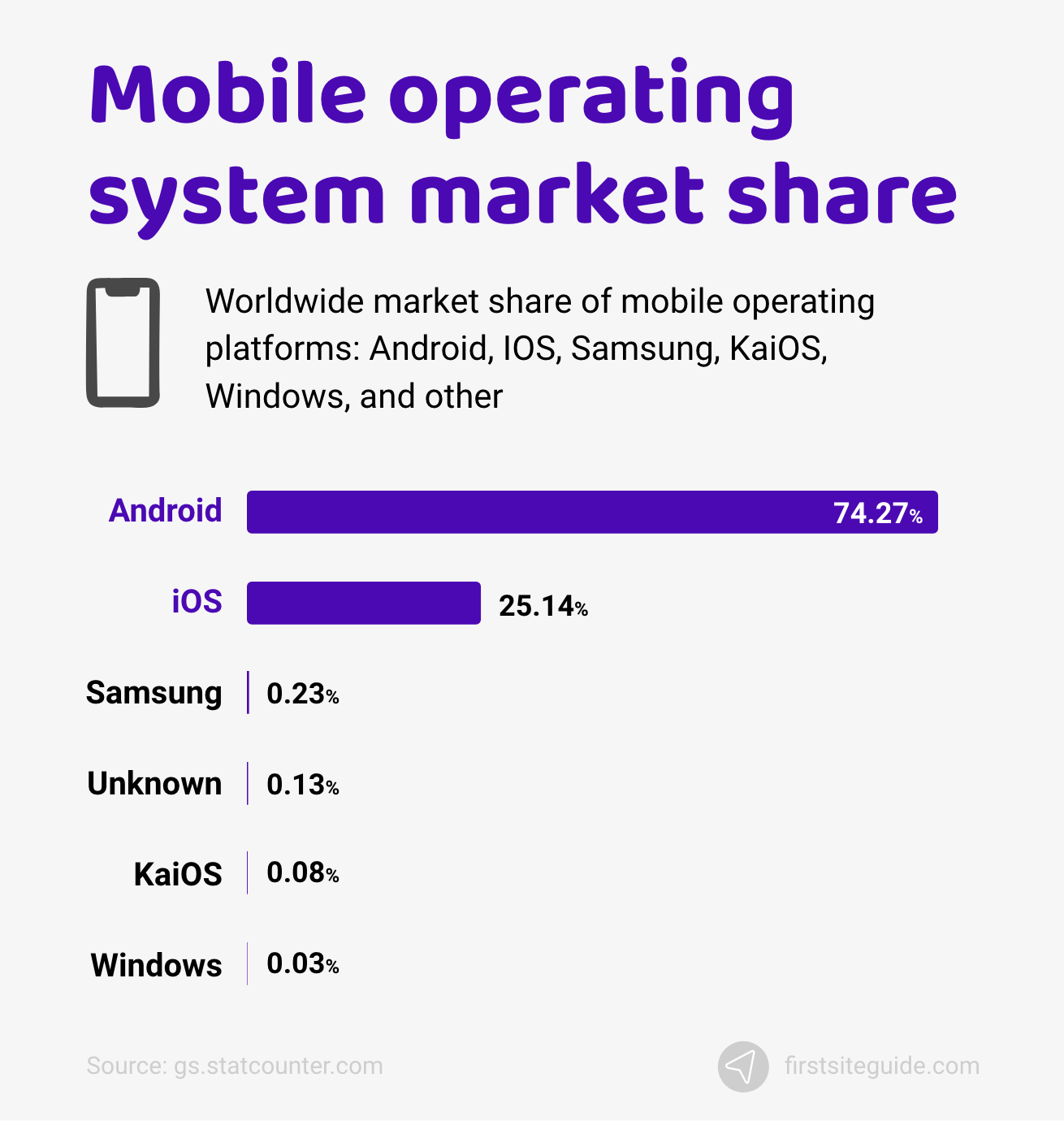
(Source: Statcounter)
25. Most popular applications used on mobile phones.
Based on this research for August 2020, the top ten most popular non-game apps on mobile phones are:
- Tiktok – 63.3 million installs
- Zoom – 52.2 million installs
- Snack Video – 43 million installs
- Google Meet – 38 million installs
- Instagram – 36 million installs
- WhatsApp – 34 million installs
- Snapchat – 24 million installs
- Telegram – 22 million installs
- Facebook – 20 million installs
- Messenger – 17 million installs
(Source: Sensortower)
26. Top countries with the widest mobile network coverage.
The list of the top ten countries with the most comprehensive mobile network coverage is surprising. Below, we’ll list the top ten countries with their internet coverage listed in percentage.
- South Korea – 95.71%
- Japan – 92.03%
- Lithuania – 84.73%
- Hong Kong – 84.52%
- Netherlands – 84.1%
- Singapore – 82.61%
- Norway – 82.42%
- Kuwait – 81.77%
- Sweden – 81.37%
- United States – 81.3%
(Source: Telegraph)
27. 5G network coverage distribution.
5G is the newest internet connection standard. There are over 15376 5G Deployments around the world distributed by 137 5G Operators.
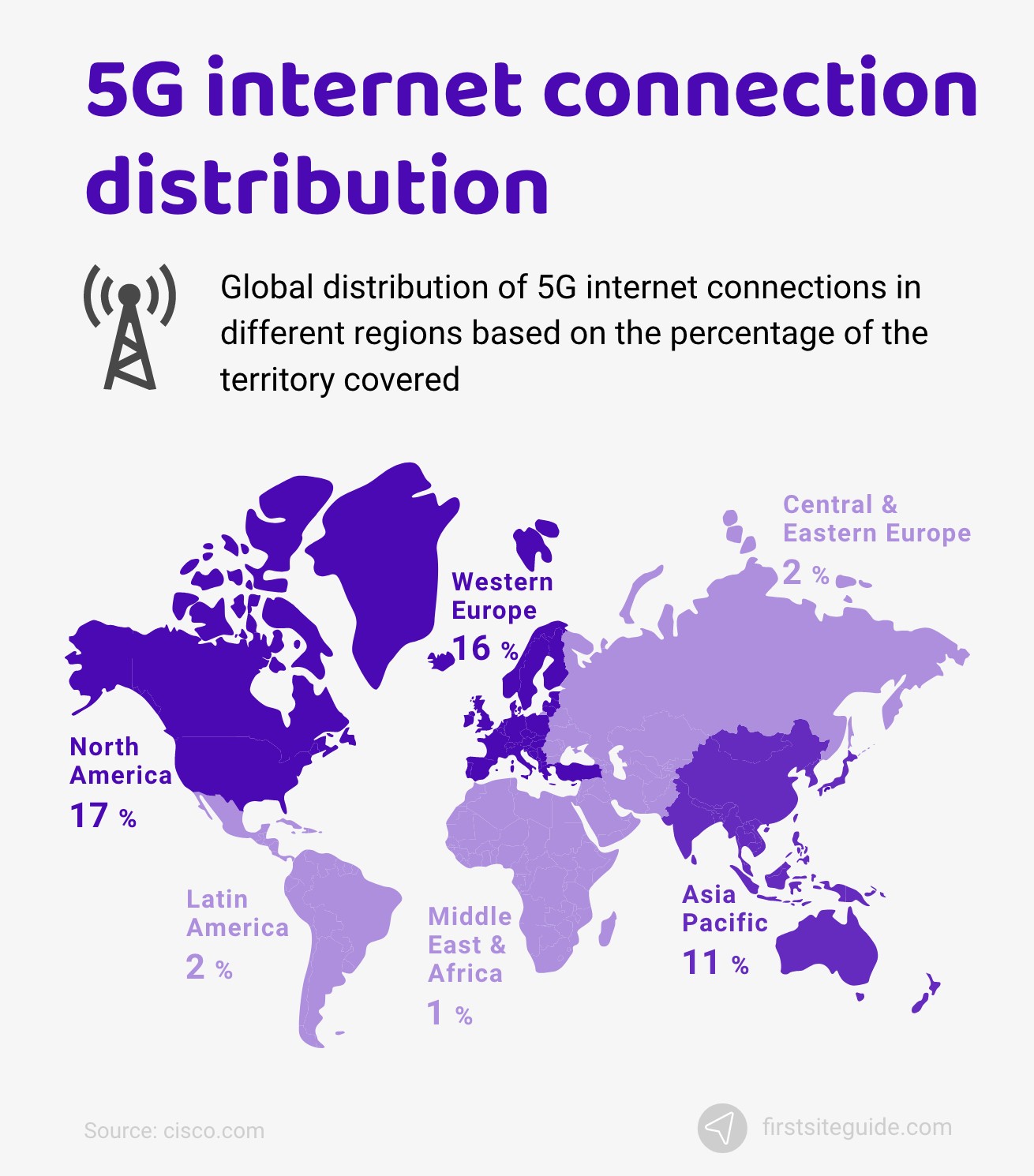


No comments:
Post a Comment